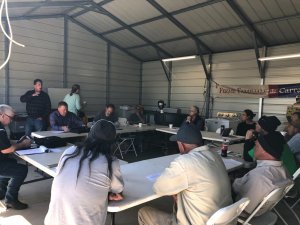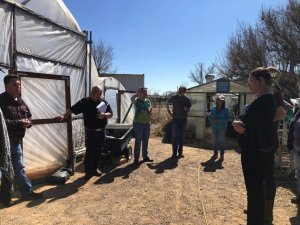This article, written by Forward Cities’ Local Director Erin Ortigoza, was originally published in the September/October 2021 issue of the Green Fire Times.
PRACTICING GOOD AGRICULTURE IN NEW MEXICO

New Mexico Farmers’ Marketing Association Tiered Food Safety Trainings in Belen
Michael Venticique, value chain coordinator with the New Mexico Farmers Marketing Association (NMFMA) recalls driving around in 2018, making connections with farmers and colleagues with a big picture question. “How might we work together in the food value chain to make small- and mid-scale agriculture more profitable so folks can make a living by continuing agricultural traditions?”
Venticique’s previous work as the Southwest regional produce supervisor for Lowe’s Pay and Save gave him a unique lens on the ins and outs of food retail, aggregation and distribution, and he found a calling in applying this work to help farmers in the N.M. food system.
Venticique sees an emerging collective momentum as food hubs throughout the state build capacity, gain food safety certification and provide accessible training for growers. With food safety practices baked into every step of the regional food value chain, he says that local products can be aggregated into larger, wholesale and institutional markets such as schools, senior centers, early childhood centers and grocery stores.
GOOD AGRICULTURE
Value chain work yielded a great deal of success in 2018, realizing additional regional food sales for N.M. growers of $1.2 million. It also illuminated inequities for smaller farmers. It was specifically through connecting farmers with local retail outlets in places like Las Cruces and Hatch that Venticique saw how smaller-scale farmers throughout the state were challenged in accessing local retail to increase their market options, with a major barrier being food safety certification.

Larger farms typically have more capacity to pursue the USDA food safety certification known as “Good Agricultural Practices” or GAP. This refers to a voluntary audit that verifies that fruits and vegetables are safely produced, packed, handled and stored to minimize risks of microbial hazards. While many larger-scale farms have attained this certification, which is often required to access wholesale retailer markets, small farmers are never going to catch up if there aren’t in-roads and on-ramps tailored to their needs.
Farmers and ranchers of all sizes in N.M. have been practicing good agriculture for generations. New Mexico-grown food is delicious, nutritious and brings the unique energy of our natural and cultural environments to families’ plates. Local growers understand the tastes and needs of their communities and prosper when New Mexicans have better access to their harvests.
For farms to increase sales and move food further into the community, there is the need for recordkeeping, traceability and a shared commitment to food safety protocols that are informed by and tailored to the state’s diversity of growers.
GAP is one option to open doors for farms, but it does not work for all. To even the playing field and create equitable access to wholesale markets for small/mid-scale farmers, additional avenues are needed that elevate the farmers’ wisdom and lived experience.
NEW MEXICO TIERED FOOD SAFETY TRAININGS
In 2019, NMFMA’s gears shifted from sale-oriented assistance to food safety capacity building in order to expand farmers’ sales and platforms. As a more accessible alternative to GAP, Tier 1 and Tier 2 trainings were developed in coordination with the Public Education Department’s farm to school program and with farmers as a “N.M. Grown” pathway.

New Mexico Farmers’ Marketing Association Tiered Food Safety Trainings in Belen
Venticique and a team of trainers work with farmers to explore food safety and help them go back to their farms with a critical eye, evaluating things such as previous land use, water quality, soil health, and pre- and post-harvest handling. The trainings also support completion of a Farm Risk Assessment Plan customized to each farmer and their unique farm. It acts as each farms’ operations manual to ensure continuous improvement and implementation of food safety practices.
Upon completion of the trainings, farmers are eligible to apply to be on the statewide approved supplier list that wholesale and institutional food service professionals can access for efficiencies in local purchasing. Over the last several years, the list has grown from about 10 farmers to more than 80… and counting.
The vision Venticique shares involves helping food hubs gain GAP certification, supporting growers in getting training and implementing safety practices. That way, food safety is baked into every step of the regional food value chain and local products can flow into larger wholesale and institutional markets for the benefit of the people they serve and to benefit the state’s agricultural economy.
ECOSYSTEM BUILDING AND GAP CERTIFIED FOOD HUBS
Ecosystem building in our food community is similar to the value chain work that has become well established in N.M. Ecosystems are networks of connected people, programs, places, and in many cases, policies that ultimately support entrepreneurial vitality in a given geographic region. The ESHIP Communities program was developed as a community-driven approach for building entrepreneurial ecosystems that elevate inclusion, relationships, collaboration and social capital across networks of entrepreneurs and those who support them. In N.M., ESHIP Río Grande is working with community partners to support cohesion in the food and agricultural ecosystem.
In early 2021, ESHIP Río Grande and NMFMA partnered to support food hubs interested in pursuing GAP certification as well as providing NMFMA member scholarships for the organization’s affiliated growers. This project is ongoing through 2021 and offers:
- Financial support for food hubs to attain membership in the USDA Fresh Systems Good Agricultural Practices (GAP) Group
- Support to help cover GAP audit costs
- NMFMA membership provides free access to Tier 1 and Tier 2 Food Safety training, customized farm safety plan development and implementation assistance, and support in applying to the N.M. Grown approved supplier list
In March 2021, two N.M. food hubs became the first to gain GAP certification. Agri-cultura Network and N.M. Harvest forged a path demonstrating the unique ways that GAP can serve as anchors in regional wholesale and institutional markets.
Food hubs are not new to N.M. Throughout the last decade, several businesses and organizations have led the way, managing aggregation, distribution and/or marketing of regional products to achieve mission driven goals centered around food accessibility, trust and equity, and supporting agricultural business viability. That foundational work has led us to where we are seeing opportunities for networking amongst food hubs—a network of food networks grounded in relationships and food safety. This stage of collaboration and capacity building at an ecosystem level is aimed to support existing grower networks and offer on-ramps to wholesale buyers for new growers, and increase equitable access to N.M. Grown produce for all New Mexicans.
ESHIP Río Grande is a supporting partner in the Regional Food System Partnership grant. This three-year USDA funding is shepherded by NMFMA. It is engaging food hubs and food/farm support organizations all over the state through a “collective impact” process—a container for developing a unique, intentional way of sharing information for solving a complex problem. In our work in the N.M. food community, attention is placed on the following goals and outcomes:
- Cultivate a supportive and resilient local food value chain coordination ecosystem.
- New Mexico becomes a model for value chain coordination.
- Generate new, and expand existing, local food value chains.
- Communities increase belief in their own power to create change. Broad geographic implementation and issues of equity are addressed.
- Generate cohesive marketing and promotion for local food and expand access points for local food purchases by low-income New Mexicans.
- Increase food security and improve food quality in vulnerable communities.
Countless people have advanced this cause but there is much to be done. In order to maximize the effectiveness of programs like these, additional stakeholders will be required. Should this work call to you and align with practices you are already implementing, please reach out. Email michaelfventicinque@gmail.com to learn more about the resources that NMFMA offers, and get involved in the Value Chain work in N.M. You can contact me at eortigoza@forwardcities.org to learn more about ecosystem building and ESHIP Río Grande.
Images courtesy of New Mexico Farmers' Marketing Association.